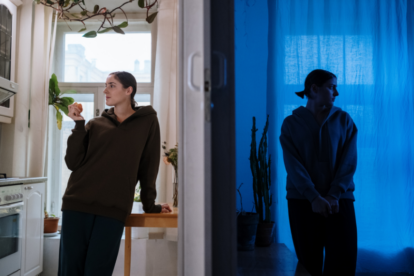Living With Paranoid Personality Disorder: How Our Family Survived

Paranoid personality disorder is a difficult mental illness that causes distrust, suspicion, and persistent false beliefs about others and the world. It is disruptive to normal functioning and causes significant distress. One of the most difficult things about paranoid personality disorder is that it makes forming and sustaining healthy relationships challenging. Families can work with their loved ones along with treatment professionals to strengthen their bonds, to learn how to communicate, and to support each other in living better with this chronic mental health issue.
There are several different types of personality disorders, which are mental illnesses that cause an abnormal way of thinking about oneself, other people, and the world in general. Paranoid personality disorder, or PPD, falls into the category of personality disorders characterized by odd thoughts and behaviors.
PPD causes paranoia: persistent false beliefs not justified by actions or any evidence. Someone with PPD believes other people are out to harm them, cannot be trusted, or are not loyal. They tend to be socially isolated and struggle to form any close relationships. They can get angry easily and hold grudges against people.
Living with PPD is very difficult, including for family members. If you suspect or know that someone you care about is struggling with PPD, take heart in the stories of other families. It is possible to work together to manage this condition, to reduce symptoms, to strengthen relationships, and to get the treatment that will make life better for everyone in the family.
PPD Wreaked Havoc on Our Family
When our daughter started showing signs of having a severe mental illness, I’m sorry to say we remained in denial for a long time. I wish now that we had faced it head on and gotten her help right away, but it is so hard to see what’s happening in someone so close to you. It’s difficult to admit that your own child is so severely sick.
It started subtly too, which is another reason we had a hard time facing the reality of her situation. In her senior year of high school, Annie started getting suspicious of her boyfriend. An old family friend, we had all known him for years, since they were both kids. Out of nowhere, she thought he was being unfaithful to her.
At first, she just suggested it, but then she insisted. She confronted him to account for all of his time when not with her. None of us could believe he would do that to her, but Annie was adamant. The first few times, she wanted to know where he had been, and he had good explanations. She accepted it. But after a couple of months, she accused him of cheating on her all the time, of having other girlfriends even. None of it made sense.
They broke up, understandably. Ethan couldn’t understand her accusations and didn’t know how to handle her. Her little brother and her father and I then went through a very difficult period for the next year. Her paranoia got worse. She got angry and lashed out at us, even though she has always been an easygoing person.
Her brother started having nightmares and doing badly at school. I had to stay home more often from work because I worried about her. And then I got fired. My husband and I were fighting more than talking at this point, and suddenly I realized that Annie was really sick.
Annie’s illness caused a lot of damage to our family, but it wasn’t her fault. I blame her father and me for not doing something sooner, but we just didn’t know about personality disorders. We now share her story with no shame, because we want others to be aware.
What we finally did to begin healing from this illness was get Annie into treatment.
What we finally did to begin healing from this illness was get Annie into treatment. What we know now is that personality disorders are notoriously difficult to treat. With her paranoia and distrust, even of us, it was hard for Annie to accept that we wanted to help her and that the treatment professionals had her best interests in mind.
It was heartbreaking to leave her at a residential facility. She thought all her worst fears about not being able to trust us were coming true. But she needed it. In care she was safe, she had the expertise of multiple mental health professionals to guide her therapy, and she had time to focus on changing her skewed world view.
We Worked Together to Heal
One of the important things we learned from Annie’s treatment is that PPD is often associated with childhood trauma. At first, we dismissed this, as there was no abuse or neglect in her past. However, our family therapist helped us to see that my husband’s chronic depression caused significant distress in the home as she was growing up.
He always tried to keep his mental illness from interfering with the children and our relationship, but the therapist explained that it probably impacted Annie despite his best efforts. We never realized how stressful it was for her and her brother to have a father who went through periods of being unable to get out of bed and to have parents who fought a lot.
A life-changing part of Annie’s residential treatment was family therapy. All four of us participated, individually, and as a group. We learned more about Annie’s challenges, and we all learned together how to support her. We practiced productive communication and strategies for calming her fears and paranoid thoughts as they flared.
Treatment Is Ongoing
An important thing we learned in Annie’s care was that this condition is not going to be cured. PPD and other personality disorders are chronic. They prepared us well for the fact that she’ll always have good days and bad, that treatment will need to be ongoing, but that there is also hope for a better life.
The treatment facility helped us find a good outpatient therapist and even brought her in to start working with Annie so that she could get comfortable with her before switching to outpatient therapy. Now, she attends weekly sessions with her trusted therapist when she’s doing well.
Admittedly, life isn’t perfect. We have even had to send Annie back into residential care for “tune-ups.” She does very well for a while but also has relapsed. Now we better understand the signs of creeping paranoia. We know how to help her challenge her destructive thoughts and move through and past the fear, distrust, and anger. Every day gets better, but treatment is an ongoing necessity.
Working on Independence
When we began treatment for Annie, my husband and I were simply surviving. Annie was barely surviving. Now that we have learned the fundamentals and she’s more stable, we are working toward making life about more than just survival.
People living with severe mental illness struggle to live independently, but we know Annie can get there. For now, she is safe at home and our family is stronger. But next year she’ll start taking some community college classes. With our support, she slowly makes progress toward independence to the degree that makes sense for her.
My advice to any family struggling with mental health issues is to confront them head-on. Don’t hesitate to talk to your doctor, to get a mental health evaluation for any family member, and to be open and honest with each other. We ignored Annie’s PPD for too long, but there was still hope. We have survived the worst and are now living our best lives with mental illness.
If you’re concerned about a loved one and believe they may need residential care, we can help.
BrightQuest offers long-term treatment for people struggling with personality disorders and other mental health conditions. To learn more about our renowned program and how we can help you or your loved one start the journey toward recovery, contact us today.






